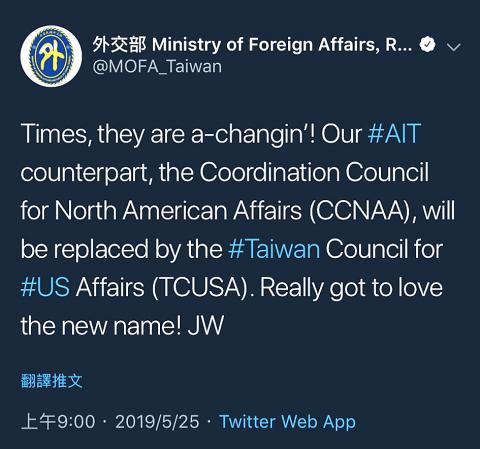The Coordination Council for North American Affairs has been renamed the Taiwan Council for US Affairs, President Tsai Ing-wen (蔡英文) said yesterday, hailing the move as a breakthrough in Taiwan-US relations.
The names of Taiwan and the US appear alongside each other in an agency’s title for the first time, symbolizing the affinity and reciprocal trust between the two nations, Tsai wrote on Facebook.
Based on the US’ Taiwan Relations Act, Washington in 1979 established the American Institute in Taiwan (AIT) to deal with affairs related to Taiwan, and Taiwan established the coordination council as a reciprocal agency, she wrote.

Screen grab from Twitter
Taiwan used the phrase “North American” instead of the US due to special historical conditions at the time, showing the difficult situation Taiwan faced in international relations, she said.
Despite past obstacles, the two sides agreed to rename the council after long-running negotiations to coincide with the 40th anniversary of the TRA, Tsai said, thanking Ministry of Foreign Affairs personnel for the achievement.
With Taiwan and the US becoming closer over the past few years, the two would work more closely on regional peace and Indo-Pacific security, the ministry said in a news release.
National Security Council Secretary-General David Lee (李大維) visited US academics and officials from May 13 to Tuesday to discuss security challenges that Taiwan and the US face together, it added.
Lee met with officials from the US National Security Council and other government agencies, as well as Asian policy experts from think tanks, including the Center for Strategic and International Studies, Brookings Institution and Georgetown University, it said.
Lee also met with government officials from Taiwan’s diplomatic allies, who reaffirmed their support for maintaining a free and open Indo-Pacific region, the ministry said.
“Times, they are a-changin’,” Minister of Foreign Affairs Joseph Wu (吳釗燮) wrote in English on the ministry’s official Twitter account yesterday. “Really got to love the new name!”
The move follows a similar name change in May 2017, when the Association of East Asian Relations was renamed the Taiwan-Japan Relations Association.
Lin Wen-cheng (林文程), a professor at National Sun Yat-sen University’s Institute of China and Asia-Pacific Studies, said the renaming signals that Taiwan and the US are moving toward establishing semi-official ties.
The previous title was unilaterally decided by the US when it switched recognition to Beijing in a bid to downplay its links to Taiwan, he said, adding that nonetheless, the renaming is a positive sign showing the US’ increasing support for Taiwan and the positive development of bilateral ties.
Meetings between Taiwanese and US national security officials were often kept confidential in the past, while the ministry’s revelation of the meetings demonstrates that bilateral relations have been improving, said Alexander Huang (黃介正), an associate professor at Tamkang University’s Graduate Institute of International Affairs and Strategic Studies and a former Mainland Affairs Council deputy minister.
Additional reporting by Peng Wan-hsin

MAKING WAVES: China’s maritime militia could become a nontraditional threat in war, clogging up shipping lanes to prevent US or Japanese intervention, a report said About 1,900 Chinese ships flying flags of convenience and fishing vessels that participated in China’s military exercises around Taiwan last month and in January last year have been listed for monitoring, Coast Guard Administration (CGA) Deputy Director-General Hsieh Ching-chin (謝慶欽) said yesterday. Following amendments to the Commercial Port Act (商港法) and the Law of Ships (船舶法) last month, the CGA can designate possible berthing areas or deny ports of call for vessels suspected of loitering around areas where undersea cables can be accessed, Oceans Affairs Council Minister Kuan Bi-ling (管碧玲) said. The list of suspected ships, originally 300, had risen to about

DAREDEVIL: Honnold said it had always been a dream of his to climb Taipei 101, while a Netflix producer said the skyscraper was ‘a real icon of this country’ US climber Alex Honnold yesterday took on Taiwan’s tallest building, becoming the first person to scale Taipei 101 without a rope, harness or safety net. Hundreds of spectators gathered at the base of the 101-story skyscraper to watch Honnold, 40, embark on his daredevil feat, which was also broadcast live on Netflix. Dressed in a red T-shirt and yellow custom-made climbing shoes, Honnold swiftly moved up the southeast face of the glass and steel building. At one point, he stepped onto a platform midway up to wave down at fans and onlookers who were taking photos. People watching from inside

Japan’s strategic alliance with the US would collapse if Tokyo were to turn away from a conflict in Taiwan, Japanese Prime Minister Sanae Takaichi said yesterday, but distanced herself from previous comments that suggested a possible military response in such an event. Takaichi expressed her latest views on a nationally broadcast TV program late on Monday, where an opposition party leader criticized her for igniting tensions with China with the earlier remarks. Ties between Japan and China have sunk to the worst level in years after Takaichi said in November that a hypothetical Chinese attack on Taiwan could bring about a Japanese

STREAMLINED: The dedicated funding would allow the US to transfer equipment to Taiwan when needed and order upgraded replacements for stockpiles, a source said The US House of Representatives on Thursday passed a defense appropriations bill totaling US$838.7 billion, of which US$1 billion is to be allocated to reinforcing security cooperation with Taiwan and US$150 million to replace defense articles provided to the nation. These are part of the Consolidated Appropriation Act, which the US House yesterday passed with 341 votes in favor and 88 against. The act must be passed by the US Senate before Friday next week to avoid another government shutdown. The US House Committee on Appropriations on Monday unveiled the act, saying that it allocates US$1 billion for the Taiwan Security Cooperation Initiative